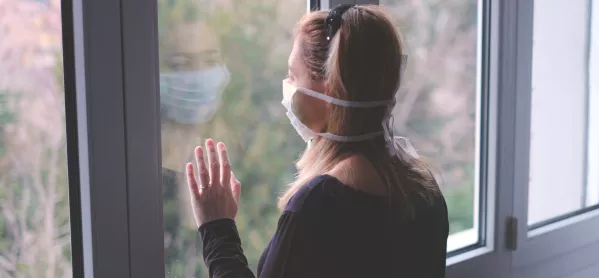- Home
- Coronavirus: ‘Self-isolating teachers asked to work’
Coronavirus: ‘Self-isolating teachers asked to work’

A union has highlighted the “reckless” practices going on in schools which are putting teachers at risk amid the coronavirus pandemic.
The NASUWT teaching union found that 51 per cent of teachers who should have been self-isolating due to Covid-19 - either through their own illness or that of a family member - were asked to attend work for at least some time during the first week of the partial school closures.
Its snapshot survey of almost a thousand teachers also found that 39 per cent of teachers classed as being “vulnerable” due to underlying health conditions, pregnancy or age said they had been asked to attend during the same week.
Coronavirus: Teacher protection ‘a matter of urgency’
Read: Williamson acknowledges teacher anxiety
Coronavirus: Sick cleaners and caretakers force closure
Chris Keates, NASUWT acting general secretary, said: “It is deeply concerning that a smaller, but still significant proportion of schools are failing to protect the health and welfare of their staff.
“Insisting that teachers, who are either in vulnerable groups or who may have coronavirus or live with those who have symptoms, attend work is simply playing fast and loose with the safety and welfare of those staff.
“At a time when we all need to be acting responsibly in order to halt the spread of Covid-19 such actions are reckless.”
While seven in 10 teachers said they felt their school was “treating them fairly” over the pandemic, the survey found a significant number of teachers did not have the facilities or information to keep themselves and others safe while working.
Nearly a third (32 per cent) said there was no adequate provision of soap and hot water for hand-washing in their school.
And well over a third (39 per cent) said they had not been provided with “appropriate guidance” on maintaining school distancing by their employer, while nearly half (48 per cent) reported a “lack of adequate arrangements” to frequently clean and disinfect frequently touched surfaces and objects in their school.
The survey also found:
• Although the vast majority said their school was operating rota arrangements, only 39 per cent said the rota had been consulted on and agreed with staff.
• Practically all teachers (98 per cent) said they had been asked to attend school during the Easter holidays.
• Thirty-six per cent said they had not been provided with the necessary IT equipment by their school to enable them to work from home.
• Only 24 per cent said they had been consulted on and agreed their work programme for working from home with their employer.
Ms Keates added: “In these unprecedented times it is deeply concerning to see that the adverse management practices some teachers face when their school is working normally are now following them into their home.
“Excessive workload, intimidation and punitive scrutiny are all being faced by teachers, by employers who fail to respect teachers’ professional judgement and fail to recognise that teachers, like all of us, are trying to manage their professional duties while also dealing with significant strain and worry about their families, their finances and their health.
“It is also deeply concerning that a large number of teachers report that good hygiene is not being followed in their school.
“Employers have a duty of care to do all that they can to keep workers safe, yet it seems that in too many cases too little protection is being put in place.”
A government spokesperson said: “We understand this is a difficult time for teachers and all school staff, who we are asking to help the country fight this virus while others stay at home to protect the NHS and save lives.
“We are asking schools, where possible, to maintain provision for vulnerable children and children of workers critical to the COVID-19 response over the Easter holidays and we know that school leaders and local authorities will make sensible decisions on staffing in order to do so.”
Register with Tes and you can read two free articles every month plus you'll have access to our range of award-winning newsletters.
Keep reading with our special offer!
You’ve reached your limit of free articles this month.
- Unlimited access to all Tes magazine content
- Save your favourite articles and gift them to your colleagues
- Exclusive subscriber-only stories
- Over 200,000 archived articles
- Unlimited access to all Tes magazine content
- Save your favourite articles and gift them to your colleagues
- Exclusive subscriber-only stories
- Over 200,000 archived articles



